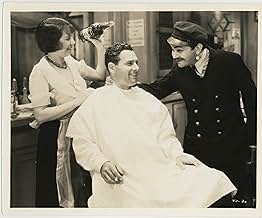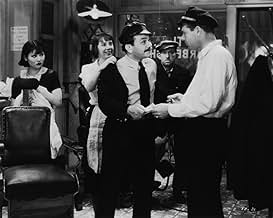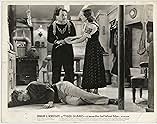AVALIAÇÃO DA IMDb
6,3/10
1,2 mil
SUA AVALIAÇÃO
Adicionar um enredo no seu idiomaA tuna fisherman marries a woman who doesn't love him.A tuna fisherman marries a woman who doesn't love him.A tuna fisherman marries a woman who doesn't love him.
- Direção
- Roteiristas
- Artistas
- Prêmios
- 2 vitórias no total
J. Carrol Naish
- Tony
- (as J. Carroll Naish)
Maurice Black
- Jean Fernandez - a Shipwrecked Crewman
- (não creditado)
Sheila Bromley
- 'Red'
- (não creditado)
Wong Chung
- Chinese Laundryman
- (não creditado)
Edwin Maxwell
- Doctor
- (não creditado)
Toshia Mori
- Oriental Lady Barber
- (não creditado)
Henry Otho
- Crewman
- (não creditado)
Inez Palange
- Mike's Neighbor
- (não creditado)
Pedro Regas
- Crewman
- (não creditado)
Joe Roig
- Undetermined Secondary Role
- (não creditado)
Hector V. Sarno
- Crewman
- (não creditado)
Harry Semels
- Crewman
- (não creditado)
Avaliações em destaque
Sorry, I forgot to add a point to my comment that was rather an important one, at least to me. Tiger Shark was shot in the early 1930s and there are some interesting scenes of men sailing their boat into a school of tuna, guided by a lookout, then lining up in the leads and pulling the fish in using flexible poles, one at a time. The scenes are authentic and exciting. Alas, they are history. Tuna fisherman now use "long lines." (Koreans and Japanese have huge industries built around this technique.) The fishing boat now needs a smaller crew (less expensive) because there no longer any mano a mano contests between fish and man. The crew simply strings out long fishing lines, guided by sonar, more than a mile long, with baited hooks fixed to the lines at short, regular intervals, set for a given depth. This has proved far more lucrative than fishing exclusively for tuna with poles. The long lines have a tendency to clean everything that swims out of the sea; not just tuna but sharks, sea turtles, porpoises, and game fish like marlin (which can't be legally sold). By the time they are harvested, many of the animals are already dead, especially the air-breathing turtles and porpoises. The industry has become much more efficient and without passion. Mike probably wouldn't have approved but the organization that would now own his boat would have.
Exciting film about a love triangle on the Monterey coast with Edward G. Robinson and Richard Arlen best friends and tuna fishermen. Robinson falls for bad girl Zita Johann who of course falls for handsome Arlen. Familiar storyline but Robinson is excellent as the Portuguese fisherman who battles the sea and the sharks to make a living. Arlen was a so-so actor but very handsome, and Johann had a strange exotic look. She's best remembered for The Mummy with Boris Karloff. Vince Barnett is funny and J. Carroll Naish has one scene. Leila Bennett plays a barber for some reason with pretty Toshio Mori as her assistant. Inez Palange plays a neighbor. Good film all around. But the highpoint is the truly remarkable footage of tuna fishing in a stormy sea.
Portuguese fisherman (Edward G. Robinson) loses a hand to a shark and later loses his young wife (Zita Johann) to his best friend (Richard Arlen). He doesn't like it. A simple plot that was reused by Warner Bros. many times over the years. It's an okay early film from Howard Hawks. Worth watching for Robinson's colorful performance. Eddie G's sporting an earring and a hook for a hand, folks. It's not Shakespeare but it's hard to look away. Real maritime footage is a plus. Classic horror fans will recognize Zita Johann from The Mummy, which was released this same year. She's a lot more subtle in this than in that film.
All the old-time Hollywood studios recycled their scripts, turning previously-filmed properties into remakes and then re-remakes. More so than any other studio, Warner Brothers were notorious for re-re-re-remaking their previous films with only very slight changes in setting and dialogue. "Tiger Shark" is an historically significant film, as this movie provided the original template for a plot line which Warners recycled about two dozen times ... each time with just enough changes to fool the audience into thinking they were seeing an original plot. Except for stories which are in the public domain (such as Cinderella), "Tiger Shark" holds the all-time record for being re-made MORE OFTEN than any other movie ... each remake being "disguised" as a new movie.
The basic plot is this: an older man with a physical handicap falls in love with an attractive young woman who owes him a favour. She marries him, more out of a sense of obligation than for love. Then she becomes attracted to a handsome young man who works alongside her handicapped husband. The young man returns her attraction, and they start having an affair. The husband discovers his wife's infidelity, and then (in the climax of the film) he and the younger man duke it out. That's the plot of "Tiger Shark", starring Edward G. Robinson, and it's also the plot of two dozen other Warners films which are uncredited remakes of "Tiger Shark".
Compare this film to "Manpower" (1941), also starring Robinson. In "Tiger Shark" he plays a one-handed fisherman, with a hook at the end of his left arm. In "Manpower" he plays an electrical lineman with a limp. In both films, his love interest is a younger woman with a European accent: Zita Johann here, Marlene Dietrich in "Manpower". Robinson's younger rival in "Tiger Shark" (played by Richard Arlen) is basically the same character as Robinson's rival in "Manpower" (George Raft). The climax of "Tiger Shark" is a fight on the seashore; the climax of "Manpower" is a fistfight at the top of a telephone pole during a lightning storm. Once you allow for the change of setting, they're both the same film. I could make the same connections between "Tiger Shark" and about two dozen other Warners films, not all of them starring Robinson.
"Tiger Shark" benefits from some excellent direction by Howard Hawks. Richard Arlen is unfairly forgotten nowadays, but he was the closest thing Hollywood had to Harrison Ford before Harrison Ford came along. (I'm referring of course to the modern Harrison Ford, not the silent-film actor of the same name.) Arlen gives a good performance here. Zita Johann is excellent here, hampered only by her thick accent. She retired early from films to marry the producer John Houseman, long before Houseman became an Oscar-winning actor. Johann's most famous role is the female lead in "The Mummy" opposite Boris Karloff. When Johann published her autobiography in the 1980s, the publishers' promo material played up the fact that Johann had co-starred with Karloff, but they managed to avoid mentioning *which* Karloff film she'd been in: apparently they were afraid we would think that Zita Johann was a "scream queen" actress who only starred in horror films.
I'll rate "Tiger Shark" 7 out of 10 on its own merits, or 9 points if you're an aspiring screenwriter who wants to study this film so you can learn how a single plot line can be reworked repeatedly.
The basic plot is this: an older man with a physical handicap falls in love with an attractive young woman who owes him a favour. She marries him, more out of a sense of obligation than for love. Then she becomes attracted to a handsome young man who works alongside her handicapped husband. The young man returns her attraction, and they start having an affair. The husband discovers his wife's infidelity, and then (in the climax of the film) he and the younger man duke it out. That's the plot of "Tiger Shark", starring Edward G. Robinson, and it's also the plot of two dozen other Warners films which are uncredited remakes of "Tiger Shark".
Compare this film to "Manpower" (1941), also starring Robinson. In "Tiger Shark" he plays a one-handed fisherman, with a hook at the end of his left arm. In "Manpower" he plays an electrical lineman with a limp. In both films, his love interest is a younger woman with a European accent: Zita Johann here, Marlene Dietrich in "Manpower". Robinson's younger rival in "Tiger Shark" (played by Richard Arlen) is basically the same character as Robinson's rival in "Manpower" (George Raft). The climax of "Tiger Shark" is a fight on the seashore; the climax of "Manpower" is a fistfight at the top of a telephone pole during a lightning storm. Once you allow for the change of setting, they're both the same film. I could make the same connections between "Tiger Shark" and about two dozen other Warners films, not all of them starring Robinson.
"Tiger Shark" benefits from some excellent direction by Howard Hawks. Richard Arlen is unfairly forgotten nowadays, but he was the closest thing Hollywood had to Harrison Ford before Harrison Ford came along. (I'm referring of course to the modern Harrison Ford, not the silent-film actor of the same name.) Arlen gives a good performance here. Zita Johann is excellent here, hampered only by her thick accent. She retired early from films to marry the producer John Houseman, long before Houseman became an Oscar-winning actor. Johann's most famous role is the female lead in "The Mummy" opposite Boris Karloff. When Johann published her autobiography in the 1980s, the publishers' promo material played up the fact that Johann had co-starred with Karloff, but they managed to avoid mentioning *which* Karloff film she'd been in: apparently they were afraid we would think that Zita Johann was a "scream queen" actress who only starred in horror films.
I'll rate "Tiger Shark" 7 out of 10 on its own merits, or 9 points if you're an aspiring screenwriter who wants to study this film so you can learn how a single plot line can be reworked repeatedly.
Tiger Shark (1932)
*** (out of 4)
A lonely fisherman (Edward G. Robinson) marries a girl out of pity only to see her fall in love with his best friend. Director Howard Hawks does a very good job at showing off a wide range of emotions from sentiment to laughs to some very intense shark attack scenes. Robinson clearly steals the show with his touching performance but the supporting roles are good too. Another highlight is seeing the old time assembly line of having the fish removed from the boat and cleaned all in the matter of minutes. Apparently Warner loved this story so much that they remade it three times within the next ten years including Robinson returning in Manpower.!!!
*** (out of 4)
A lonely fisherman (Edward G. Robinson) marries a girl out of pity only to see her fall in love with his best friend. Director Howard Hawks does a very good job at showing off a wide range of emotions from sentiment to laughs to some very intense shark attack scenes. Robinson clearly steals the show with his touching performance but the supporting roles are good too. Another highlight is seeing the old time assembly line of having the fish removed from the boat and cleaned all in the matter of minutes. Apparently Warner loved this story so much that they remade it three times within the next ten years including Robinson returning in Manpower.!!!
Você sabia?
- CuriosidadesQuita wears traditional Portuguese attire for her wedding.
- Erros de gravaçãoWhen Quita tells Mike to leave her alone after being informed of her father's death, he responds twice with "yeah, all right". But Robinson as Mike drops the Portuguese accent he uses for the role and uses a regular American accent.
- Cenas durante ou pós-créditosOpening Card: San Diego
- ConexõesFeatured in Sharksploitation (2023)
- Trilhas sonorasAbdulla Bulbul Amir
(1877) (uncredited)
Written by William Percy French
Sung by Richard Arlen and members of the crew
Principais escolhas
Faça login para avaliar e ver a lista de recomendações personalizadas
Detalhes
- Data de lançamento
- País de origem
- Idiomas
- Também conhecido como
- Tiger Shark
- Locações de filme
- Monterey, Califórnia, EUA(outdoor sequences)
- Empresa de produção
- Consulte mais créditos da empresa na IMDbPro
- Tempo de duração
- 1 h 17 min(77 min)
- Cor
- Mixagem de som
- Proporção
- 1.37 : 1
Contribua para esta página
Sugerir uma alteração ou adicionar conteúdo ausente






































